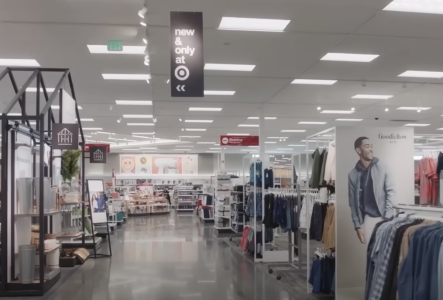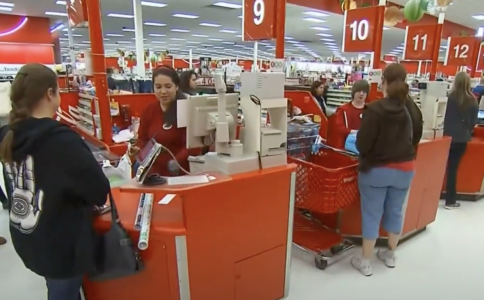Target is ending price matching with Amazon and Walmart—what that means for shoppers
By
Veronica E.
- Replies 0
If you’ve ever saved money at checkout by showing a lower Amazon or Walmart price on your phone, that option is about to disappear—at least at Target.
Starting July 28, the popular retailer will end its price-matching policy for Amazon and Walmart, limiting future adjustments to Target’s own in-store and online prices only.
While many shoppers may not notice the difference right away, the change could matter for anyone who regularly comparison-shops big-ticket items.
Target says the decision was based on customer behavior—not outside pressure—but it still marks a shift away from one of the more generous policies in the industry.
As retail continues to evolve, it’s another sign of companies tightening up amid changing consumer habits and rising costs.

Currently, Target allows customers to request a price match if they find an identical item for less at Amazon, Walmart, Target.com, or with Target Circle deals, either at the time of purchase or within 14 days after buying.
But beginning July 28, the policy will only apply to price changes within Target itself—whether in stores or online. External price matching will no longer be honored.
In a statement to USA TODAY, a Target spokesperson said:
"We’ve found our guests overwhelmingly price match Target and not other retailers, which reflects the great value and trust in pricing consumers see across our assortment and deals."
Target added that the change aligns with customer habits and will still allow shoppers to feel confident about getting the best price at Target.
While the timing of this move raised questions—especially given recent economic uncertainty and consumer backlash—Target clarified to USA TODAY that the change is not tied to its financial struggles, tariffs, or recent boycotts.
Instead, it reflects what they see as a more relevant and streamlined service based on how most shoppers were already using the policy.
Still, retail experts say the decision makes financial sense.
Neil Saunders, a retail analyst with GlobalData, told USA TODAY that Target’s profitability and margins have weakened in recent years.
"If it wants to invest more in stores, then it needs to be more financially disciplined," Saunders explained.
"Ending price matching helps to achieve this, especially at a time when costs are rising because of tariffs."
The move also simplifies operations, bringing Target in line with other major retailers.
Walmart, for example, ended competitor price matching in 2019 and only honors price adjustments for the same item found cheaper on Walmart.com—and only when purchased in-store, subject to the store manager’s discretion.
It excludes third-party sellers, Walmart Marketplace, and Neighborhood Market locations.
Amazon, meanwhile, does not offer price matching at all, stating: "We don’t offer price matching. We constantly evaluate Amazon’s prices to offer customers low, competitive prices every day."
Best Buy continues to offer price matching but only for identical new items that match in brand, model number, and color.
Losing the option to price match Amazon and Walmart could impact those making large purchases—especially electronics and appliances.
"Price matching is more important on big-ticket items… where shoppers are very active in making price comparisons," Saunders said.
He added that it’s “a deterioration in customer service,” but one that brings Target’s policy in line with most competitors.
Still, Target will continue to honor its own price drops within 14 days, so shoppers can still receive a refund if an item they recently bought goes on sale.
And many customers weren’t using the external match feature regularly—so for the average purchase, the impact may be minimal.
Target’s external price match policy may be ending, but here are still several ways to keep your budget on track:

Target’s decision reflects a larger shift in the retail industry.
With inflation, higher supply costs, and evolving shopper behavior, many companies are scaling back flexible perks.
Price matching, generous returns, and frequent couponing are becoming less common, especially as retailers focus on stabilizing profits.
Meanwhile, consumers are being more cautious with spending—prompting a delicate balancing act between affordability and profitability.
Target has also faced consumer boycotts over the past year, some related to its diversity, equity, and inclusion (DEI) initiatives.
Two campaigns led by members of the Black community have called on shoppers to boycott the retailer, either temporarily or permanently, due to perceived rollbacks in DEI efforts.
While Target denies these boycotts influenced the price match decision, they remain part of the broader public conversation about how retailers respond to both political pressure and economic forces.
Even small policy changes can have a big impact on how we shop.
As retailers shift their strategies, staying informed helps you make smarter choices with every purchase.
Read next: Hundreds of Amazon deliveries, zero orders—one woman’s bizarre year-long mystery solved

Have you used Target’s price matching in the past? Will this policy change affect your buying habits—especially for electronics or household essentials?
Let us know how you plan to save going forward and share your favorite shopping tips with other readers. At The GrayVine, we believe in staying smart, sharing knowledge, and getting the most out of every dollar.
Starting July 28, the popular retailer will end its price-matching policy for Amazon and Walmart, limiting future adjustments to Target’s own in-store and online prices only.
While many shoppers may not notice the difference right away, the change could matter for anyone who regularly comparison-shops big-ticket items.
Target says the decision was based on customer behavior—not outside pressure—but it still marks a shift away from one of the more generous policies in the industry.
As retail continues to evolve, it’s another sign of companies tightening up amid changing consumer habits and rising costs.

Target is updating its price match policy, ending comparisons with Amazon and Walmart starting July 28. Image Source: YouTube / CNBC.
What’s changing in Target’s policy?
Currently, Target allows customers to request a price match if they find an identical item for less at Amazon, Walmart, Target.com, or with Target Circle deals, either at the time of purchase or within 14 days after buying.
But beginning July 28, the policy will only apply to price changes within Target itself—whether in stores or online. External price matching will no longer be honored.
In a statement to USA TODAY, a Target spokesperson said:
"We’ve found our guests overwhelmingly price match Target and not other retailers, which reflects the great value and trust in pricing consumers see across our assortment and deals."
Target added that the change aligns with customer habits and will still allow shoppers to feel confident about getting the best price at Target.
Also read: Target is facing new protests as a significant anniversary draws national attention
Is this about profit or policy?
While the timing of this move raised questions—especially given recent economic uncertainty and consumer backlash—Target clarified to USA TODAY that the change is not tied to its financial struggles, tariffs, or recent boycotts.
Instead, it reflects what they see as a more relevant and streamlined service based on how most shoppers were already using the policy.
Still, retail experts say the decision makes financial sense.
Neil Saunders, a retail analyst with GlobalData, told USA TODAY that Target’s profitability and margins have weakened in recent years.
"If it wants to invest more in stores, then it needs to be more financially disciplined," Saunders explained.
"Ending price matching helps to achieve this, especially at a time when costs are rising because of tariffs."
The move also simplifies operations, bringing Target in line with other major retailers.
Walmart, for example, ended competitor price matching in 2019 and only honors price adjustments for the same item found cheaper on Walmart.com—and only when purchased in-store, subject to the store manager’s discretion.
It excludes third-party sellers, Walmart Marketplace, and Neighborhood Market locations.
Amazon, meanwhile, does not offer price matching at all, stating: "We don’t offer price matching. We constantly evaluate Amazon’s prices to offer customers low, competitive prices every day."
Best Buy continues to offer price matching but only for identical new items that match in brand, model number, and color.
Also read: Your next Target run may look a little different—here’s why shoppers are speaking out
What does this mean for shoppers?
Losing the option to price match Amazon and Walmart could impact those making large purchases—especially electronics and appliances.
"Price matching is more important on big-ticket items… where shoppers are very active in making price comparisons," Saunders said.
He added that it’s “a deterioration in customer service,” but one that brings Target’s policy in line with most competitors.
Still, Target will continue to honor its own price drops within 14 days, so shoppers can still receive a refund if an item they recently bought goes on sale.
And many customers weren’t using the external match feature regularly—so for the average purchase, the impact may be minimal.
Also read: The Target deal that’s turning heads—and it’s surprisingly practical
How you can still save at Target
Target’s external price match policy may be ending, but here are still several ways to keep your budget on track:
- Target Circle – The free rewards program offers 1% back on purchases, access to personalized deals, and exclusive in-app discounts.
- Use the 14-day price adjustment – If your item goes on sale at Target within two weeks, you can still claim the difference.
- Watch for sales – Weekly ads, app deals, and seasonal promotions are still some of the best ways to save.
- Stack coupons and gift cards – Combine manufacturer coupons with Target promos like “Buy 2, get a $5 gift card” for double savings.
- Shop clearance – Many deals hide in plain sight on endcaps or in online clearance sections.
- Compare prices elsewhere – For big-ticket purchases, check other stores like Best Buy that still offer price matching.

Shoppers may need to adjust their savings strategies as Target phases out competitor price matching. Image Source:
YouTube / CBS 8 San Diego
YouTube / CBS 8 San Diego
Also read: Boycott begins at Target amid concerns over rising checkout costs
The broader retail picture
Target’s decision reflects a larger shift in the retail industry.
With inflation, higher supply costs, and evolving shopper behavior, many companies are scaling back flexible perks.
Price matching, generous returns, and frequent couponing are becoming less common, especially as retailers focus on stabilizing profits.
Meanwhile, consumers are being more cautious with spending—prompting a delicate balancing act between affordability and profitability.
Also read: Target hit with lawsuit over alleged privacy violations
The boycott backdrop
Target has also faced consumer boycotts over the past year, some related to its diversity, equity, and inclusion (DEI) initiatives.
Two campaigns led by members of the Black community have called on shoppers to boycott the retailer, either temporarily or permanently, due to perceived rollbacks in DEI efforts.
While Target denies these boycotts influenced the price match decision, they remain part of the broader public conversation about how retailers respond to both political pressure and economic forces.
Even small policy changes can have a big impact on how we shop.
As retailers shift their strategies, staying informed helps you make smarter choices with every purchase.
Read next: Hundreds of Amazon deliveries, zero orders—one woman’s bizarre year-long mystery solved
Key Takeaways
- Target will stop price matching Amazon and Walmart beginning July 28, limiting price adjustments to Target stores and Target.com within 14 days.
- Target says the change was made because shoppers primarily matched prices within its own system—not due to financial pressure or consumer boycotts.
- Retail expert Neil Saunders called the move a loss for consumers but noted it aligns Target with competitors like Walmart and Amazon, which don’t offer price matching.
- Target’s policy shift comes amid broader economic challenges, including rising tariffs, slumping sales, and public pressure from ongoing boycotts over DEI issues.
Have you used Target’s price matching in the past? Will this policy change affect your buying habits—especially for electronics or household essentials?
Let us know how you plan to save going forward and share your favorite shopping tips with other readers. At The GrayVine, we believe in staying smart, sharing knowledge, and getting the most out of every dollar.






